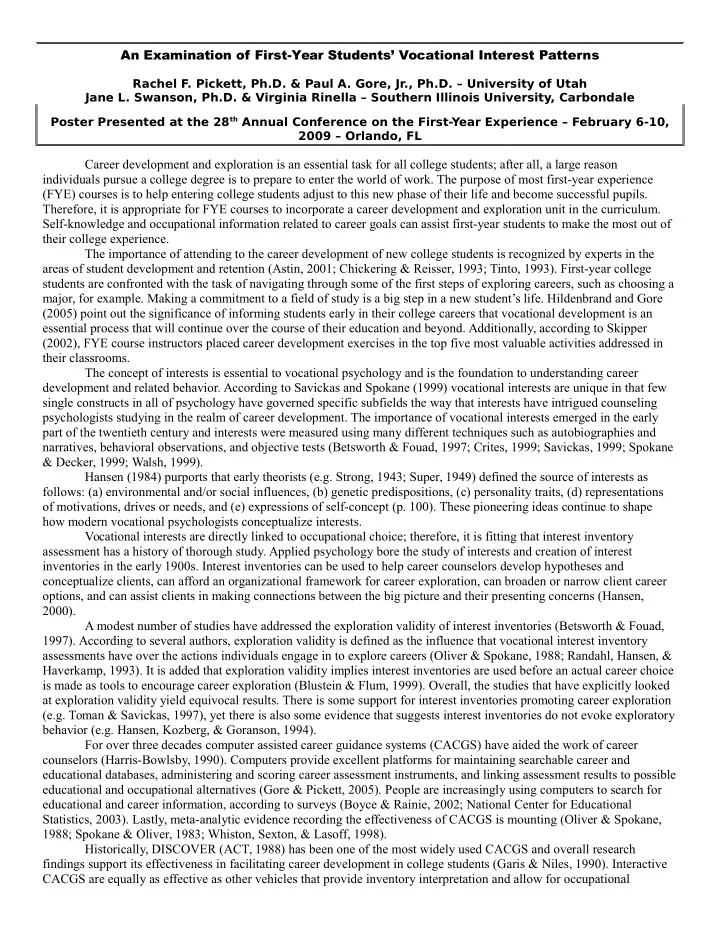

An Examination of First-Year Students’ Vocational Interest Patterns Rachel F . Pickett, Ph.D. & Paul A. Gore, Jr., Ph.D. – University of Utah Jane L. Swanson, Ph.D. & Virginia Rinella – Southern Illinois University, Carbondale Poster Presented at the 28 th Annual Conference on the First-Year Experience – February 6-10, 2009 – Orlando, FL Career development and exploration is an essential task for all college students; after all, a large reason individuals pursue a college degree is to prepare to enter the world of work. The purpose of most first-year experience (FYE) courses is to help entering college students adjust to this new phase of their life and become successful pupils. Therefore, it is appropriate for FYE courses to incorporate a career development and exploration unit in the curriculum. Self-knowledge and occupational information related to career goals can assist first-year students to make the most out of their college experience. The importance of attending to the career development of new college students is recognized by experts in the areas of student development and retention (Astin, 2001; Chickering & Reisser, 1993; Tinto, 1993). First-year college students are confronted with the task of navigating through some of the first steps of exploring careers, such as choosing a major, for example. Making a commitment to a field of study is a big step in a new student’s life. Hildenbrand and Gore (2005) point out the significance of informing students early in their college careers that vocational development is an essential process that will continue over the course of their education and beyond. Additionally, according to Skipper (2002), FYE course instructors placed career development exercises in the top five most valuable activities addressed in their classrooms. The concept of interests is essential to vocational psychology and is the foundation to understanding career development and related behavior. According to Savickas and Spokane (1999) vocational interests are unique in that few single constructs in all of psychology have governed specific subfields the way that interests have intrigued counseling psychologists studying in the realm of career development. The importance of vocational interests emerged in the early part of the twentieth century and interests were measured using many different techniques such as autobiographies and narratives, behavioral observations, and objective tests (Betsworth & Fouad, 1997; Crites, 1999; Savickas, 1999; Spokane & Decker, 1999; Walsh, 1999). Hansen (1984) purports that early theorists (e.g. Strong, 1943; Super, 1949) defined the source of interests as follows: (a) environmental and/or social influences, (b) genetic predispositions, (c) personality traits, (d) representations of motivations, drives or needs, and (e) expressions of self-concept (p. 100). These pioneering ideas continue to shape how modern vocational psychologists conceptualize interests. Vocational interests are directly linked to occupational choice; therefore, it is fitting that interest inventory assessment has a history of thorough study. Applied psychology bore the study of interests and creation of interest inventories in the early 1900s. Interest inventories can be used to help career counselors develop hypotheses and conceptualize clients, can afford an organizational framework for career exploration, can broaden or narrow client career options, and can assist clients in making connections between the big picture and their presenting concerns (Hansen, 2000). A modest number of studies have addressed the exploration validity of interest inventories (Betsworth & Fouad, 1997). According to several authors, exploration validity is defined as the influence that vocational interest inventory assessments have over the actions individuals engage in to explore careers (Oliver & Spokane, 1988; Randahl, Hansen, & Haverkamp, 1993). It is added that exploration validity implies interest inventories are used before an actual career choice is made as tools to encourage career exploration (Blustein & Flum, 1999). Overall, the studies that have explicitly looked at exploration validity yield equivocal results. There is some support for interest inventories promoting career exploration (e.g. Toman & Savickas, 1997), yet there is also some evidence that suggests interest inventories do not evoke exploratory behavior (e.g. Hansen, Kozberg, & Goranson, 1994). For over three decades computer assisted career guidance systems (CACGS) have aided the work of career counselors (Harris-Bowlsby, 1990). Computers provide excellent platforms for maintaining searchable career and educational databases, administering and scoring career assessment instruments, and linking assessment results to possible educational and occupational alternatives (Gore & Pickett, 2005). People are increasingly using computers to search for educational and career information, according to surveys (Boyce & Rainie, 2002; National Center for Educational Statistics, 2003). Lastly, meta-analytic evidence recording the effectiveness of CACGS is mounting (Oliver & Spokane, 1988; Spokane & Oliver, 1983; Whiston, Sexton, & Lasoff, 1998). Historically, DISCOVER (ACT, 1988) has been one of the most widely used CACGS and overall research findings support its effectiveness in facilitating career development in college students (Garis & Niles, 1990). Interactive CACGS are equally as effective as other vehicles that provide inventory interpretation and allow for occupational
Recommend
More recommend